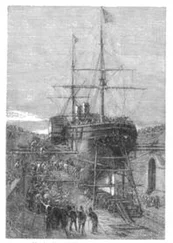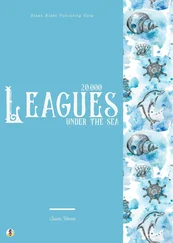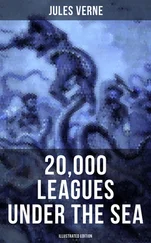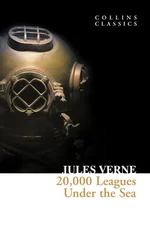Jules Verne - Twenty Thousand Leagues Under the Sea
Здесь есть возможность читать онлайн «Jules Verne - Twenty Thousand Leagues Under the Sea» — ознакомительный отрывок электронной книги совершенно бесплатно, а после прочтения отрывка купить полную версию. В некоторых случаях можно слушать аудио, скачать через торрент в формате fb2 и присутствует краткое содержание. Жанр: sf_writing, на английском языке. Описание произведения, (предисловие) а так же отзывы посетителей доступны на портале библиотеки ЛибКат.
- Название:Twenty Thousand Leagues Under the Sea
- Автор:
- Жанр:
- Год:неизвестен
- ISBN:нет данных
- Рейтинг книги:5 / 5. Голосов: 2
-
Избранное:Добавить в избранное
- Отзывы:
-
Ваша оценка:
- 100
- 1
- 2
- 3
- 4
- 5
Twenty Thousand Leagues Under the Sea: краткое содержание, описание и аннотация
Предлагаем к чтению аннотацию, описание, краткое содержание или предисловие (зависит от того, что написал сам автор книги «Twenty Thousand Leagues Under the Sea»). Если вы не нашли необходимую информацию о книге — напишите в комментариях, мы постараемся отыскать её.
Twenty Thousand Leagues Under the Sea — читать онлайн ознакомительный отрывок
Ниже представлен текст книги, разбитый по страницам. Система сохранения места последней прочитанной страницы, позволяет с удобством читать онлайн бесплатно книгу «Twenty Thousand Leagues Under the Sea», без необходимости каждый раз заново искать на чём Вы остановились. Поставьте закладку, и сможете в любой момент перейти на страницу, на которой закончили чтение.
Интервал:
Закладка:
"He is quite right," I said. "I have heard of this picture; but the subject represented is taken from a legend, and you know what to think of legends in the matter of natural history. Besides, when it is a question of monsters, the imagination is apt to run wild. Not only is it supposed that these poulps can draw down vessels, but a certain Olaus Magnus speaks of a cephalopod a mile long, that is more like an island than an animal. It is also said that the Bishop of Nidros was building an altar on an immense rock. Mass finished, the rock began to walk, and returned to the sea. The rock was a poulp. Another bishop, Pontoppidan, speaks also of a poulp on which a regiment of cavalry could maneuver. Lastly, the ancient naturalists speak of monsters whose mouths were like gulfs, and which were too large to pass through the Straits of Gibraltar."
"But how much is true of these stories?" asked Conseil.
"Nothing, my friends; at least of that which passes the limit of truth to get to fable or legend. Nevertheless, there must be some ground for the imagination of the story-tellers. One cannot deny that poulps and cuttle-fish exist of a large species, inferior, however, to the cetaceans. Aristotle has stated the dimensions of a cuttle-fish as five cubits, or nine feet two inches. Our fishermen frequently see some that are more than four feet long. Some skeletons of poulps are preserved in the museums of Trieste and Montpellier, that measure two yards in length. Besides, according to the calculations of some naturalists, one of these animals, only six feet long, would have tentacles twenty-seven feet long. That would suffice to make a formidable monster."
"Do they fish for them in these days?" asked Ned.
"If they do not fish for them, sailors see them at least. One of my friends, Captain Paul Bos of Havre, has often affirmed that he met one of these monsters, of colossal dimensions, in the Indian seas. But the most astonishing fact, and which does not permit of the denial of the existence of these gigantic animals, happened some years ago, in 1861."
"What is the fact?" asked Ned Land.
"This is it. In 1861, to the northeast of Teneriffe, very nearly in the same latitude we are in now, the crew of the dispatch-boat Alector perceived a monstrous cuttle-fish swimming in the waters. Captain Bouguer went near to the animal, and attacked it with harpoons and guns, without much success, for balls and harpoons glided over the soft flesh. After several fruitless attempts, the crew tried to pass a slip-knot round the body of the mollusk. The noose slipped as far as the caudal fins, and there stopped. They tried then to haul it on board, but its weight was so considerable that the tightness of the cord separated the tail from the body, and, deprived of this ornament, he disappeared under the water."
"Indeed! Is that a fact?"
"An indisputable fact, my good Ned. They proposed to name this poulp "Bouguer's cuttle-fish.' "
"What length was it?" asked the Canadian.
"Did it not measure about six yards?" said Conseil, who, posted at the window, was examining again the irregular windings of the cliff.
"Precisely," I replied.
"Its head," rejoined Conseil, "was it not crowned with eight tentacles, that beat the water like a nest of serpents?"
"Precisely."
"Had not its eyes, placed at the back of its head, considerable development?"
"Yes, Conseil."
"And was not its mouth like a parrot's beak?"
"Exactly, Conseil."
"Very well! No offense to master," he replied quietly; "if this is not Bouguer's cuttle-fish, it is, at least, one of its brothers."
I looked at Conseil. Ned Land hurried to the window.
"What a horrible beast!" he cried.
I looked in my turn, and could not repress a gesture of disgust. Before my eyes was a horrible monster, worthy to figure in the legends of the marvelous. It was an immense cuttle-fish, being eight yards long. It swam crossways in the direction of the Nautilus with great speed, watching us with its enormous staring green eyes. Its eight arms, or rather feet, fixed to its head, that have given the name of cephalopod to these animals, were twice as long as its body, and were twisted like the Furies' hair. One could see the 250 air-holes on the inner side of the tentacles. The monster's mouth, a horned beak like a parrot's, opened and shut vertically. Its tongue, a horned substance, furnished with several rows of pointed teeth, came out quivering from this veritable pair of shears. What a freak of nature-a bird's beak on a mollusk! Its spindle-like body formed a fleshy mass that might weigh 4,000 to 5,000 lbs.; the varying color changing with great rapidity, according to the irritation of the animal, passed successively from livid gray to reddish-brown. What irritated this mollusk? No doubt the presence of the Nautilus, more formidable than itself, and on which its suckers or its jaws had no hold. Yet, what monsters these poulps are! What vitality the Creator has given them! What vigor in their movements! And they possess three hearts! Chance had brought us in presence of this cuttle-fish, and I did not wish to lose the opportunity of carefully studying this specimen of cephalopods. I overcame the horror that inspired me; and, taking a pencil, began to draw it.
"Perhaps this is the same which the Alector saw," said Conseil.
"No," replied the Canadian; "for this is whole, and the other had lost its tail."
"That is no reason," I replied. "The arms and tails of these animals are re-formed by redintegration; and, in seven years, the tail of Bouguer's cuttle-fish has no doubt had time to grow."
By this time other poulps appeared at the port light. I counted seven. They formed a procession after the Nautilus, and I heard their beaks gnashing against the iron hull. I continued my work. These monsters kept in the water with such precision that they seemed immovable. Suddenly the Nautilus stopped. A shock made it tremble in every plate.
"Have we struck anything?" I asked.
"In any case," replied the Canadian, "we shall be free, for we are floating."
The Nautilus was floating, no doubt, but it did not move. A minute passed. Captain Nemo, followed by his lieutenant, entered the drawing-room. I had not seen him for some time. He seemed dull. Without noticing or speaking to us, he went to the panel, looked at the poulps, and said something to his lieutenant. The latter went out. Soon the panels were shut. The ceiling was lighted. I went toward the captain.
"A curious collection of poulps?" I said.
"Yes, indeed, Mr. Naturalist," he replied; "and we are going to fight them, man to beast."
I looked at him. I thought I had not heard aright.
"Man to beast?" I repeated.
"Yes, sir. The screw is stopped. I think that the horny jaw of one of the cuttle-fish is entangled in the blades. That is what prevents our moving."
"What are you going to do?"
"Rise to the surface, and slaughter this vermin."
"A difficult enterprise."
"Yes, indeed. The electric bullets are powerless against the soft flesh, where they do not find resistance enough to go off. But we shall attack them with the hatchet."
"And the harpoon, sir," said the Canadian, "if you do not refuse my help."
"I will accept it, Master Land."
"We will follow you," I said; and following Captain Nemo, we went toward the central staircase.
There, about ten men with boarding hatchets were ready for the attack. Conseil and I took two hatchets; Ned Land seized a harpoon. The Nautilus had then risen to the surface. One of the sailors, posted on the top ladder-step, unscrewed the bolts of the panels. But hardly were the screws loosed, when the panel rose with great violence, evidently drawn by the suckers of a poulp's arm. Immediately one of these arms slid like a serpent down the opening, and twenty others were above. With one blow of the axe, Captain Nemo cut this formidable tentacle, that slid wriggling down the ladder. Just as were pressing one on the other to reach the platform, two other arms, lashing the air, came down on the seaman placed before Captain Nemo and lifted him up with irresistible power. Captain Nemo uttered a cry, and rushed out. We hurried after him.
Читать дальшеИнтервал:
Закладка:
Похожие книги на «Twenty Thousand Leagues Under the Sea»
Представляем Вашему вниманию похожие книги на «Twenty Thousand Leagues Under the Sea» списком для выбора. Мы отобрали схожую по названию и смыслу литературу в надежде предоставить читателям больше вариантов отыскать новые, интересные, ещё непрочитанные произведения.
Обсуждение, отзывы о книге «Twenty Thousand Leagues Under the Sea» и просто собственные мнения читателей. Оставьте ваши комментарии, напишите, что Вы думаете о произведении, его смысле или главных героях. Укажите что конкретно понравилось, а что нет, и почему Вы так считаете.












